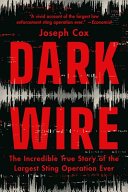Dark Wire by Joseph Cox — Book Review
In an era where digital privacy feels more like an oxymoron than a right, Joseph Cox’s “Dark Wire” arrives as both a stark exposé and a gripping narrative that challenges our understanding of surveillance technology. It prompts the question: In a world where information is currency, how much are we willing to trade for convenience? Cox doesn’t just ask this question—he explores it with journalistic rigor and a storyteller’s flair, making “Dark Wire” a must-read for anyone invested in the digital age.
From the outset, “Dark Wire” establishes a tense, almost noir-like atmosphere as it delves into the murky waters of electronic eavesdropping and digital espionage. Cox’s writing is both sharp and accessible, a blend that is reminiscent of the best tech journalism. The book combines the urgency of a thriller with the depth of a well-researched documentary. It’s paced with precision; Cox knows when to let the tension simmer and when to apply pressure, keeping the reader engaged without feeling overwhelmed. This balance makes it accessible to both tech-savvy readers and those new to the intricacies of surveillance technology.
The tone of “Dark Wire” is questioning yet authoritative, nuanced yet direct. Cox manages to maintain a journalistic objectivity while still conveying a deep-seated concern about the implications of unchecked surveillance. The mood is often tense, with the undercurrent of a looming threat that feels all too real in today’s world. This book is ideally suited for readers who are curious about the intersection of technology, privacy, and ethics—those who perhaps have followed the developments around the NSA or the revelations by Edward Snowden. It’s for the kind of reader who enjoys peeling back the layers of complex issues, understanding not just the “what” and “how,” but the “why.”
At its core, “Dark Wire” is a detailed investigation into the clandestine operations that underpin modern surveillance. Cox meticulously unpacks how governments and private entities wield technology as a tool for both protection and control. He argues that while surveillance can indeed safeguard societies, it also poses significant risks to personal freedoms. The book delves into the technicalities of how surveillance is conducted, from the hardware and software used to the legal loopholes that enable such operations. Yet, Cox never loses sight of the human element—the impact on individuals whose lives are touched by this invisible web.
One of Cox’s most compelling arguments is the inherent tension between security and privacy. He explores this dichotomy by highlighting real-world examples where surveillance has both thwarted threats and infringed on individual rights. The book doesn’t offer easy answers but instead presents a nuanced discussion that encourages readers to reflect on their own stance. Cox also examines the role of tech companies, questioning their complicity and accountability in facilitating surveillance, thus sparking a broader dialogue about corporate responsibility in the digital age.
“Dark Wire” doesn’t exist in a vacuum; it resonates with current events and other works that have tackled similar themes. In a post-Snowden era, where data breaches and privacy debates are ubiquitous, Cox’s book feels particularly relevant. It echoes the concerns raised in works like Shoshana Zuboff’s “The Age of Surveillance Capitalism,” but with a sharper focus on the mechanics of surveillance rather than its economic implications. The book also aligns with ongoing global discussions about data protection laws and digital rights, adding depth and context to these debates.
Reflecting on “Dark Wire,” I found myself reconsidering my own digital habits. It’s easy to become complacent, to assume that privacy invasions are a distant threat—something that happens to others, not us. Yet, Cox’s narrative personalizes the issue, making it clear that surveillance technology touches everyone. This realization has prompted me to be more mindful of my digital footprint, to question how much of my personal information is out there and who has access to it. It’s a thought-provoking read that encourages a deeper engagement with the technology we often take for granted.
In conclusion, “Dark Wire” is a compelling, insightful exploration of a complex and timely issue. Joseph Cox’s ability to weave technical detail with human stories makes it an engaging read that is as informative as it is thought-provoking. This book is particularly valuable for those interested in technology, privacy, and ethics, but it extends its reach to anyone who uses digital devices—which is to say, all of us. Whether you’re a tech enthusiast, a privacy advocate, or simply a concerned citizen, “Dark Wire” offers a vital perspective on the stakes of surveillance in the digital age. It’s a call to awareness and action, urging us to rethink our relationship with technology before it’s too late.

